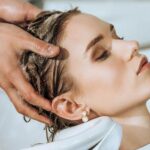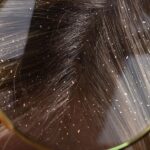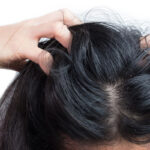Dry dandruff is one of the most common scalp conditions that affects many people around the world. Although it is not a serious health threat, it can be very bothersome and negatively impact our well-being and self-confidence. In this article, we explain how to recognize dry dandruff and how to treat it effectively.
What does dry dandruff look like?
Dry dandruff is a distinctive form of dandruff, easily recognized by its specific features, including:
- small, white flakes – the most noticeable symptom of dry dandruff is the presence of tiny, white flakes on the scalp. These flakes are usually small, light, and powdery,
- visible flakes on clothes and hair – flakes often fall from the hair and settle on shoulders and clothing, especially on dark fabrics, making them more noticeable,
- dry, flaky scalp – the scalp may appear dry and peeling. Lack of proper hydration leads to dryness and flaking,
- no excessive oiliness – unlike oily dandruff, dry dandruff is not associated with excess sebum production. The scalp is rather dry and matte,
- itchiness – dry dandruff causes itching of the scalp. It can be mild or intense, leading to scratching, which in turn can cause irritation and further flaking.
Dry dandruff is often mistaken for oily dandruff, which is characterized by larger, yellowish flakes adhering to the scalp due to excess sebum production. It is also sometimes confused with scalp psoriasis, which causes thicker, silvery scales and redness. Dry dandruff, on the other hand, is defined by small, white flakes on the scalp and hair.
Read more: What is the difference between dry dandruff and oily dandruff?
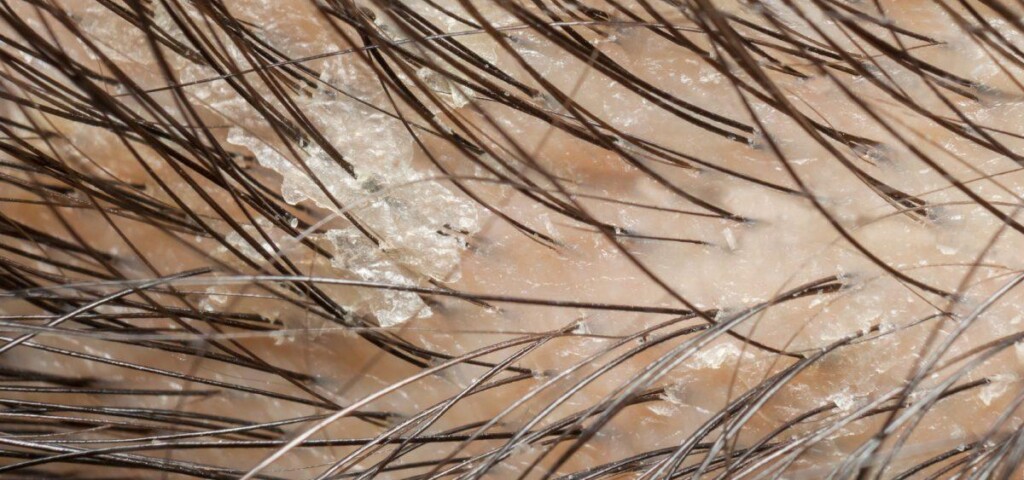
What causes dry dandruff?
Dry dandruff can result from a variety of factors, including health issues, improper hair care, environmental conditions, and lifestyle habits. One of the main causes is naturally dry skin, which flakes and forms tiny, white scales. Scalp dryness may result from low humidity, hot water, or frequent hair washing. Using the wrong hair products, such as shampoos and conditioners with harsh detergents, can also irritate and dry out the scalp.
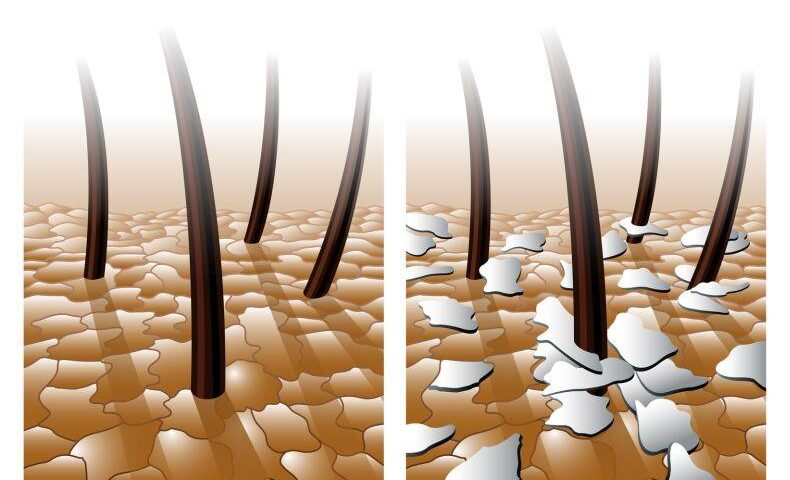
Hormonal changes also affect scalp condition. Puberty, pregnancy, menopause, or other hormonal imbalances may contribute to dry dandruff. High stress levels impact skin health through hormonal disturbances and a weakened immune system. Stress may also lead to frequent touching or scratching of the scalp, which worsens dandruff. In addition, an improper diet lacking essential nutrients such as B vitamins, zinc, and omega-3 fatty acids contributes to scalp dryness and flaking.
Read more: Dandruff – causes, types, how to treat? Home remedies
How to treat dry dandruff?
Dry dandruff is a bothersome condition that affects comfort in daily life – but the good news is, it can be treated! The first step is choosing the right shampoo for dry dandruff containing ingredients such as zinc pyrithione, selenium sulfide, or salicylic acid. These substances help fight yeast, soothe inflammation, and reduce flaking. It is best to use sulfate-free shampoos, which are gentler on the scalp and help maintain its natural moisture balance. Shampoos with aloe vera or plant oils can be particularly beneficial.
It is also important to regularly moisturize the scalp with oils such as coconut oil or olive oil. Apply the oil to the scalp, leave it on for 30 minutes, and then wash with a gentle shampoo. Moisturizing conditioners and masks also help maintain proper scalp hydration. A healthy, balanced diet rich in B vitamins, zinc, and omega-3 fatty acids further supports scalp health.
Home remedies for dry dandruff
Home remedies can also be effective in addressing dry dandruff. Coconut oil, for example, has moisturizing and antibacterial properties. Apply it to the scalp, massage gently, leave for 30 minutes, then wash with a mild shampoo. Apple cider vinegar is another helpful option, thanks to its antifungal and antibacterial effects. Use it diluted with water in a 1:2 ratio, apply to the scalp, leave for 15 minutes, then rinse.
Baking soda can act as a natural exfoliant, helping to remove dead skin cells and reduce flaking. Apply a small amount to wet hair, gently massage into the scalp, then rinse with a mild shampoo. Aloe vera gel is also an excellent choice, providing hydration and soothing irritation. Apply fresh aloe gel directly to the scalp and wash off after 30 minutes.
Which shampoo is best for dry dandruff?
A scalp affected by dry dandruff requires the right shampoo to combat the problem. Look for shampoos with moisturizing ingredients that help maintain proper hydration, such as aloe vera, glycerin, coconut oil, or shea butter. Salicylic acid can also be beneficial, as it helps reduce flaking. It is crucial to avoid shampoos with harsh detergents like SLS and SLES, which can dry out the scalp. Tea tree oil shampoos are also useful, as they fight fungi and bacteria.
Why is proper care important in treating dry dandruff?
Dry dandruff is not only inconvenient but also affects self-confidence. Proper scalp care is key to managing it. Just like the skin on other parts of the body, the scalp needs care to stay healthy. Regular cleansing, moisturizing, and soothing irritation keep the scalp in good condition. Proper products help maintain the skin’s hydrolipid balance, preventing excessive flaking.
Dry dandruff is often caused by scalp dryness resulting from factors such as harsh hair care products, frequent washing, poor diet, or stress. Proper care allows identification and elimination of these causes. Even after successfully treating dandruff, the scalp may remain prone to recurrence. Consistent, appropriate care helps prevent relapses, keeping the scalp healthy and resistant to factors that cause flaking.
Choosing the right products, such as anti-dandruff shampoos and moisturizing conditioners, helps relieve symptoms like itching, redness, and flaking. These products contain active ingredients with anti-inflammatory, antifungal, and moisturizing properties.
At OT.CO Clinic, we understand how important it is to keep hair and scalp in good condition. That’s why we offer consultations with our specialists – trichologists, cosmetologists, and dermatologists. Our experts will help you select the right products and treatment plan for dry dandruff. We encourage you to contact us to learn more about our full range of services.



